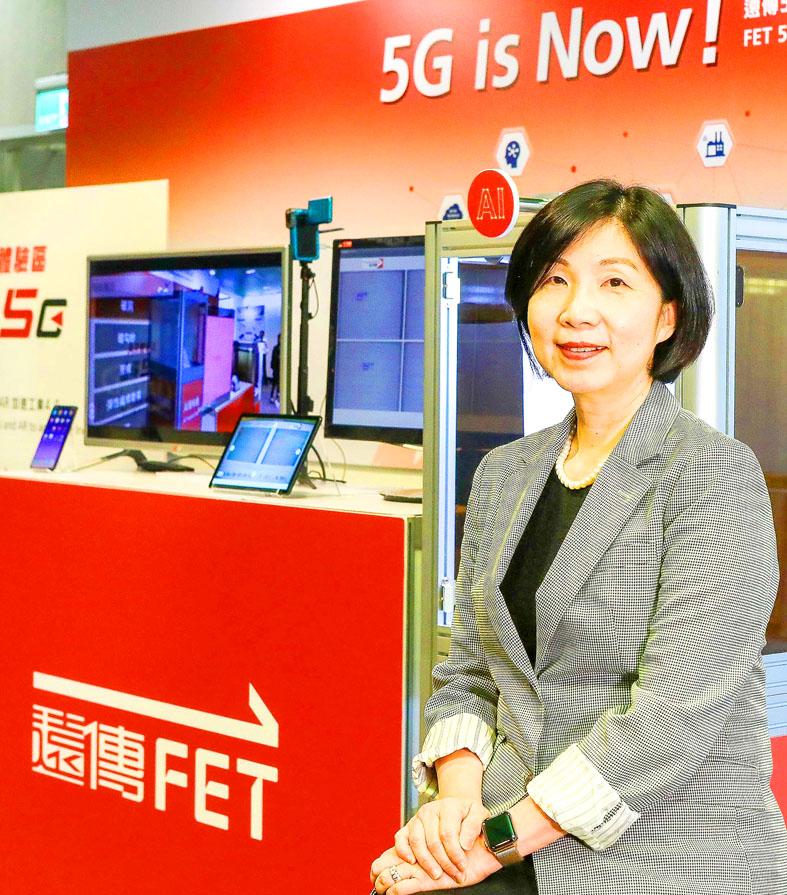Far EasTone Telecommunications Co (遠傳電信) expects a proposed merger with Asia Pacific Telecom Co (APT, 亞太電信) to add at least NT$3 billion (US$107 million) in earnings before interest, taxes, depreciation and amortization (EBITDA) in the first year of combination, mostly from savings in operating expenses regarding network deployment and operation.
Far EasTone on Friday unveiled its plan to acquire APT via a share-swap deal valued at about NT$24.7 billion.
The company plans to issue 356.7 million new shares for APT shareholders, it said.

Photo: Wang Yi-hung, Taipei Times
“This [NT$3 billion] is a rather conservative estimate,” Far EasTone president Chee Ching (井琪) told an online investors’ conference yesterday. “I will be comfortable with NT$3 billion synergy contribution in the first year. Any upsides will be just bonuses.”
As both companies use Ericsson AB equipment and technology, about 90 percent of APT’s base stations can directly join Far EasTone’s network upon approval of the merger by local regulators, Ching said.
Two telecoms integrating into one would prevent overlapping investments, she said.
Far EasTone also expects synergy from combined capacity in the 28 gigahertz (GHz) frequency band, as the two telecoms together have 800 megahertz in 5G capacity.
The company is exploring new business opportunities to provide low-Earth-orbit (LEO) Internet services in collaboration with satellite companies like StarLink, Ching said.
The company also plans to use the 28GHz bandwidth for enterprise clients to build private networks, she said.
Far EasTone expects EBITDA to expand 8.1 percent to NT$30.45 billion this year from NT$28.17 billion last year.
The company said mobile telecom services and “new economy,” including cloud-based and digital services, are growth engines.
The forecast does not factor in synergies from the planned merger.
“We will continue to grow the telecom business, which is different from the past few years when telecom [services] had been declining,” Ching said. “Now we are seeing ... demand and growth momentum from telecom as well.”
Net income is expected to grow 1.1 percent to NT$9.22 billion this year from NT$9.12 billion last year, Far EasTone said.
That would translate into earnings of NT$2.83 per share, up from NT$2.8 last year.
Revenue is expected to rise 4.1 percent to NT$88.79 billion this year from NT$85.32 billion last year.
Capital expenditures this year are expected to fall about 8 percent to NT$11.1 billion from NT$12.1 billion last year.
The company has proposed to distribute a cash dividend of NT$3.25 per share, the same as last year and 2020.
The proposal is subject to shareholders’ approval during the annual general meeting in June, the company said.

SEEKING CLARITY: Washington should not adopt measures that create uncertainties for ‘existing semiconductor investments,’ TSMC said referring to its US$165 billion in the US Taiwan Semiconductor Manufacturing Co (TSMC, 台積電) told the US that any future tariffs on Taiwanese semiconductors could reduce demand for chips and derail its pledge to increase its investment in Arizona. “New import restrictions could jeopardize current US leadership in the competitive technology industry and create uncertainties for many committed semiconductor capital projects in the US, including TSMC Arizona’s significant investment plan in Phoenix,” the chipmaker wrote in a letter to the US Department of Commerce. TSMC issued the warning in response to a solicitation for comments by the department on a possible tariff on semiconductor imports by US President Donald Trump’s

‘FAILED EXPORT CONTROLS’: Jensen Huang said that Washington should maximize the speed of AI diffusion, because not doing so would give competitors an advantage Nvidia Corp cofounder and chief executive officer Jensen Huang (黃仁勳) yesterday criticized the US government’s restrictions on exports of artificial intelligence (AI) chips to China, saying that the policy was a failure and would only spur China to accelerate AI development. The export controls gave China the spirit, motivation and government support to accelerate AI development, Huang told reporters at the Computex trade show in Taipei. The competition in China is already intense, given its strong software capabilities, extensive technology ecosystems and work efficiency, he said. “All in all, the export controls were a failure. The facts would suggest it,” he said. “The US

The government has launched a three-pronged strategy to attract local and international talent, aiming to position Taiwan as a new global hub following Nvidia Corp’s announcement that it has chosen Taipei as the site of its Taiwan headquarters. Nvidia cofounder and CEO Jensen Huang (黃仁勳) on Monday last week announced during his keynote speech at the Computex trade show in Taipei that the Nvidia Constellation, the company’s planned Taiwan headquarters, would be located in the Beitou-Shilin Technology Park (北投士林科技園區) in Taipei. Huang’s decision to establish a base in Taiwan is “primarily due to Taiwan’s talent pool and its strength in the semiconductor

French President Emmanuel Macron has expressed gratitude to Hon Hai Precision Industry Co (鴻海精密) for its plan to invest approximately 250 million euros (US$278 million) in a joint venture in France focused on the semiconductor and space industries. On his official X account on Tuesday, Macron thanked Hon Hai, also known globally as Foxconn Technology Group (富士康科技集團), for its investment projects announced at Choose France, a flagship economic summit held on Monday to attract foreign investment. In the post, Macron included a GIF displaying the national flag of the Republic of China (Taiwan), as he did for other foreign investors, including China-based